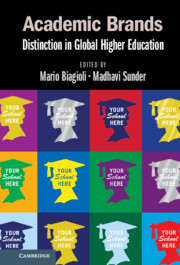Academic Brands
The first comprehensive analysis of the emergence of academic brands, this book explores how the modern university is being transformed as it competes in an increasingly global economy of higher education where luxury is replacing access. More than just a sign of corporatization and privatization, academic brands provide a unique window on the university’s concerns and struggles with conveying “excellence” and reputation in a competitive landscape organized by rankings, while also capitalizing on its brand to generate revenue when state support dwindles. This multidisciplinary volume addresses topics including the uniqueness of academic brands, their role in the global brand economy of distinction, and their vulnerability to problematic social and political associations. By focusing on brands, the volume analyzes the tensions between the university’s traditional commitment to public interest values – education, basic research, and the production of knowledge – and its increasingly managerial culture framed by corporate, private values. This book is also Available as Open Access on Cambridge Core.
Mario Biagioli is Distinguished Professor of Law and Communication at UCLA. He has also taught at Harvard, Stanford, Chicago, UC Davis, and the EHESS (Paris). A former Guggenheim, IAS, and CASBS fellow, he is the author of Galileo Courtier (1993) and Galileo’s Instruments of Credit (2006), the editor of The Science Studies Reader (1998), and the co-editor of Making and Unmaking Intellectual Property (2011), Nature Engaged (2011), From Russia with Code (2019), and Gaming the Metrics (2020).
Madhavi Sunder is the Frank Sherry Professor of Intellectual Property Law and Associate Dean for Graduate and International Programs at the Georgetown University Law Center. She is a leading scholar of intellectual property and law and culture. Her articles have appeared in the Yale Law Journal, Stanford Law Review and numerous other law journals. Her book, From Goods to a Good Life: Intellectual Property and Global Justice, was published in 2012 by Yale University Press.

